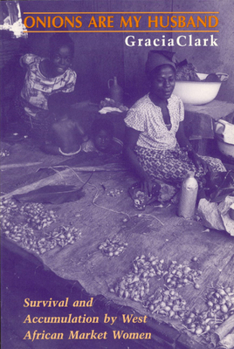Onions Are My Husband: Survival and Accumulation by West African Market Women
Select Format
Select Condition 
Book Overview
In the most comprehensive analysis to date of the world of open air marketplaces of West Africa, Gracia Clark studies the market women of Kumasi, Ghana, in order to understand the key social forces that generate, maintain, and continually reshape the shifting market dynamics. Probably the largest of its kind in West Africa, the Kumasi Central Market houses women whose positions vary from hawkers of meals and cheap manufactured goods to powerful wholesalers, who control the flow of important staples. Drawing on more than four years of field research, during which she worked alongside several influential market "Queens", Clark explains the economic, political, gender, and ethnic complexities involved in the operation of the marketplace and examines the resourcefulness of the market women in surviving the various hazards they routinely encounter, from coups d'etat to persistent sabotage of their positions from within.
Format:Paperback
Language:English
ISBN:0226107809
ISBN13:9780226107806
Release Date:January 1995
Publisher:University of Chicago Press
Length:488 Pages
Weight:1.55 lbs.
Dimensions:1.1" x 6.0" x 9.0"
Customer Reviews
2 ratings
Pithy Onions
Published by Thriftbooks.com User , 15 years ago
In her book Onions Are My Husband, Gracia Clark uses Ghana's Kumasi Central Market as a grounding point for her exploration of the female traders' social assets and cultural world. Clark's ethnographic project is ambitious in scale. Her lens of analysis does not focus solely on tracing the life experience of the trader in the market; she extends the scope of her consideration to the geographical, historical, familial, and political environments that shape the trader's contemporary reality. Clark divides her work into four sections, discussing the Kumasi Central Market's place in geography and history, the people and enterprises of the market, the informal networks and organizing principles of market actors, and, finally, the ideological place of the market with respect to individual identity formation as well as state processes. The social story that rises out of Clark's decisively holistic approach is one united by the overarching themes of autonomy and survival. As far as ethnographies go, Onions Are My Husband is neither brief nor breezy--such, perhaps, is the cost of breadth. That said, Clark does manage successfully to usher her readers through a multitude of interrelated issues without yielding to the temptation of oversimplification. Clark's core strength as an ethnographer rises from her ability to zoom in and out of each dimension of her research, from the micro- to the macro-level. This seamless movement along a sliding scale--from the individual, to the city, to the state, to the international community, and everywhere in between--helps clarify the lines of significance between each level of social organization, thereby contributing a critical dose of cohesiveness to the book overall. As a result of Clark's "zooming lens," readers are able to walk away from the text with a firm understanding of female traders' struggles for autonomy and survival in an environment dominated by power differentials and instability.
Book Review
Published by Thriftbooks.com User , 15 years ago
In her ethnography Onions Are My Husband: Survival and Accumulation by West African Market Women, Gracia Clark enters the field of Kumasi Central Market in Ghana hoping to understand the key social forces that generate, maintain and continually reshape the market's changing dynamics. To go about doing this, she explores and explains the infinite economic, political, gender, kinship and ethnic complexities involved in the operation of the marketplace. From explaining the nuances of the geographic layout of the market, to tracing the historical trajectory of women in market trade, to analyzing the dual roles women play as both mother and trader, she extensively explores the life of women traders in Ghana from every possible vantage point. Her analysis is centered around the concepts of survival and accumulation: she looks at how women seek to accrue financial and political power in their roles as traders so as to ensure domestic and familial stability as well as personal strength and agency. She especially focuses on how the way in which they seek to access power is inherently limited by gendered and ethnic identities located within various systems of domination (422-423). Through examining Kumasi Central Market and women's actions within and through it, Clark brings to light the relationship between marginality and autonomy (403), highlights the necessity of flexibility, and emphasizes the value placed on resourcefulness and agency. These extensive explorations on Clark's part, as well as the subsequent analyses and conclusions that she draws from her research are some of the most positive aspects of this book. Many of the themes which she explores are relevant not only for study in this particular class, but also in a variety of other related fields, such as anthropology and women's studies more broadly, economics, African studies, demography, and history. An in-depth analysis of the interaction of multiple factors like gender, ethnicity, and colonization as they relate to a particular subject, such as Clark's focus on the historical trajectory of women traders in Kumasi on pages 316-326, allows readers to see that modern institutions and beliefs develop out of a synthesis of numerous factors. This realization can be helpful in that it prevents one from boiling all analysis down to one simplistic cause. Furthermore, Clark does an admirable job of illuminating her role as ethnographer in her initial chapters. She introduces her mission, her methods and her position in a way that gives the reader a good sense of where she is and what she is doing. By laying out her own first visual impressions of the market (17), explaining the ways in which her relationships with traders developed and transformed (19-20), and listing her own thoughts and concerns, as well as how they changed over her time in Ghana (23-26), she weaves herself into her ethnography in an authoritative but uncomplicated way. Although she continues to insert herself throughout the






